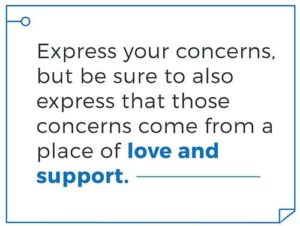- Jun 30
- AddictionTreatment
When you have a loved one struggling with substance use disorder and want to talk to them about it, the prospect of the conversation can be nerve-racking. It’s a tough subject, and sometimes it’s even more challenging to set aside time for a meaningful conversation. A conversation over text or the phone doesn’t always signal the gravity of the issue.
How to Talk to a Loved One Struggling with Substance Use Disorder
First, it is important to recognize that addiction is a disease. Someone with a substance use disorder is not able to take control of this problem without professional addiction treatment. As a loved one, you cannot stop the individual’s substance use; you can only encourage the person to  seek treatment through a licensed treatment provider or healthcare professional.
seek treatment through a licensed treatment provider or healthcare professional.
If you’re not sure what kind of drug an individual is using or whether one has an addiction, education will help you recognize certain behavior patterns or health issues associated with different types of substances and addictions. The more you understand the facts of addiction, the greater your understanding will be about what someone’s going through – and how they can overcome it.
In approaching a loved one about their substance use, the key is to choose your words and moment carefully when telling them how you feel. Ideally, pick a time when he or she is sober and when both of you are feeling calm.
Tips on Talking to Your Loved One Struggling with Substance Use Disorder
- Begin the conversation in an open, caring and supportive frame of mind.
- Plan what you are going to say. This can be an emotionally charged conversation. Script out what you’d like to say and go over it beforehand – it will help keep you on track.
- Be sure that your loved one knows where they stand with you and that you mean what you say. Express your concerns, but be sure to also express that those concerns come from a place of love and support.
- Listen and respect what they have to say, too. It may help the individual face up to the problem. Even if your first attempt to address the problem is not successful, it may be more difficult to get them to open up later if you don’t listen to them.
It is also important to keep in mind that as much as you may want someone to get help for their substance use, you can’t force someone to enter treatment. Begging or threatening does not usually work, and in many cases, this can result in unintended consequences. You can only encourage someone to consider substance abuse treatment programs. Recovery will come, only if and when the person decides to seek a healthier lifestyle.
Substance Abuse Treatment Programs at Gateway
If you have questions or are concerned about a friend or family member, contact Gateway at 877.505.4673 and let us provide you with the answers you need to take the next step.


